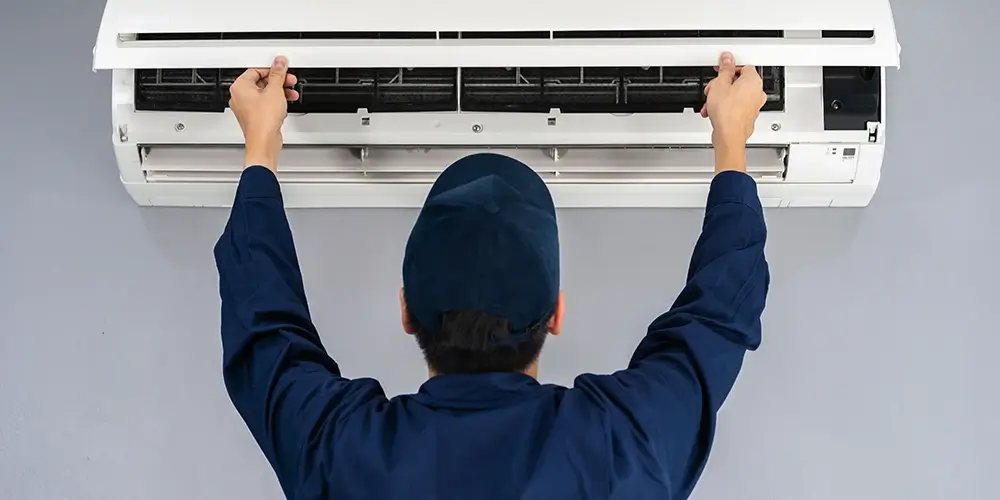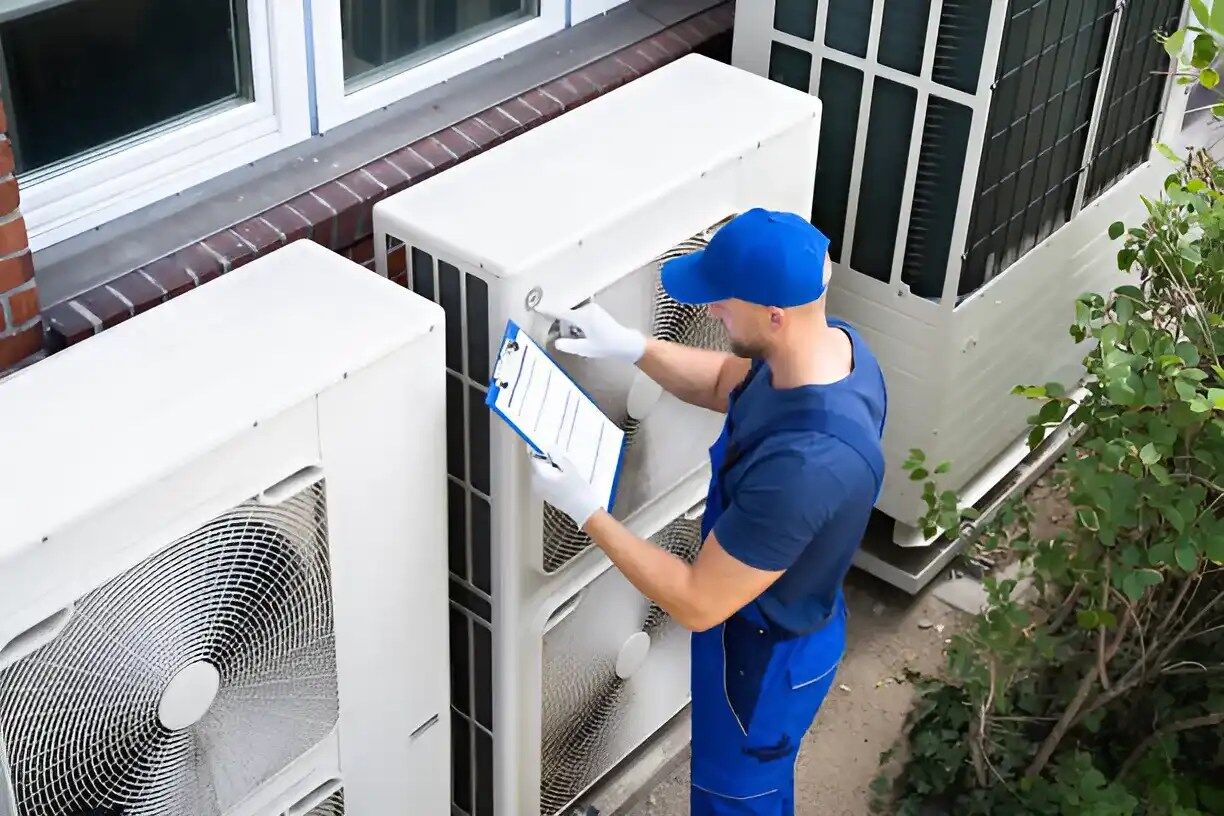Ac Air Conditioner Repair - Truths
Ac Air Conditioner Repair - Truths
Blog Article
Get This Report on Air Conditioning Repair Near Me
Fix Air Conditioner: Expert Cooling System Remediation Guarantees Your Home Stays Comfortable All Year Round
Types of AC Systems
When tackling air conditioner repair, comprehending the kind of cooling system you're dealing with can save time, money, and irritation. Ever questioned why some units cool a room quicker than others? Or why particular systems seem to break down more frequently? Let's peel back the layers.
Central Air Conditioning
Ac Repair Near Me for Beginners
Think of a read more cool breeze streaming through a whole house, whispering comfort into every corner. Central air systems do precisely that. They utilize a network of ducts to disperse cooled air, relying on a compressor and condenser outside, coupled with an evaporator coil inside. However when this complex beast falters, determining the concern can be like discovering a needle in a haystack.
Split Systems

Split systems are a popular choice for numerous homes-- part indoor unit, part outdoor compressor. They use versatility and effectiveness, but their double nature means repair work can include either element. Have you ever heard a strange sound outside your house just to find the indoor system isn't cooling? That's a classic sign of a split system glitch.
Some Known Factual Statements About Ac Fixing
Window Units
These compact warriors fight summertime heat by fitting comfortably into a window frame. They combine all components into a single box. Their simplicity often means less repair work headaches, however ignoring filters or enabling debris accumulation can result in lessened efficiency or breakdowns.
Ductless Mini-Splits
Ac Fixing Fundamentals Explained
Ductless systems bypass ductwork entirely, making them ideal for homes without existing ventilation. They're peaceful, effective, and remarkably resilient. When repair work are required, technicians need to be proficient at dealing with refrigerant lines and electrical connections-- no small accomplishment.
Quick Reference Table
| Type | Key Includes | Common Repair Work Issues |
|---|---|---|
| Central Air | Ductwork, whole-house cooling | Duct leaks, compressor failure |
| Split System | Indoor & & outside units | Refrigerant leakages, fan motor issues |
| Window Unit | All-in-one, simple setup | Dirty filters, electrical faults |
| Ductless Mini-Split | No ducts, zoned cooling | Line leaks, sensor breakdowns |
Facts About Ac Fixing Uncovered
Unwinding the Most Frequent Air Conditioning Predicaments
Have you ever wondered why your a/c unexpectedly stops cooling during a sweltering afternoon? One common culprit is an unclean or blocked air filter. This sneaky villain limits airflow, requiring your system to work overtime, which not only decreases performance but can also result in early breakdowns. Envision attempting to breathe through a scarf taken in dust-- it's tiring!
Another regular misstep is refrigerant leaks. These unnoticeable leakages don't simply decrease cooling power however can also harm the compressor, the heart of your AC system. How often do you check for unusual hissing noises or ice development on the coils? Catching these signs early can save you from pricey repairs down the line.
Beyond the Essentials: Lesser-Known Issues
The Buzz on Air Conditioner Repair Near Me
Sometimes, the thermostat itself is the nuisance. Miscalibrated or faulty thermostats send combined signals, causing the AC to cycle erratically. Ever experienced your air conditioner switching on and off in rapid succession? That's called brief biking, a sneaky effectiveness drainer that can wear components much faster than you 'd anticipate.
Electrical problems, such as used electrical wiring or a malfunctioning capacitor, might hide below the surface area. AC Air Conditioner Repair. These frequently manifest as AC units stopping working to start or suddenly closing down. An expert eye knows to check these components with precision tools, something a casual glance won't expose
Expert Tips for Diagnosing Common Air Conditioning Problems
Some Known Details About Air Conditioning Repair
- Check and change air filters regularly-- every 1 to 3 months depending upon usage and environment.
- Listen for unusual sounds like rattling or buzzing that might signal loose parts or electrical faults.
- Examine the outside system for particles or obstructions that restrain air flow and cause getting too hot.
- Look for frost accumulation on evaporator coils, a hint towards refrigerant problems or air flow constraints.
- Evaluate the thermostat settings and recalibrate if the temperature readings feel off.
Quick Recommendation Table: Symptoms & & Probable Triggers

| Symptom | Probable Cause | Professional Pointer |
|---|---|---|
| Warm air blowing | Low refrigerant or filthy coils | Clean coils and inspect for leakages immediately |
| Brief biking | Thermostat issues or oversized system | Change thermostat settings and speak with sizing guidelines |
| System won't begin | Electrical faults or capacitor failure | Test circuitry and replace capacitors as needed |
| Water leakage | Obstructed drain line or frozen evaporator | Clear drain lines and examine for coil icing |
DO IT YOURSELF Air Conditioner Upkeep Tips
Facts About Repair Air Conditioner Near Me Uncovered
Ever observed your air conditioner sputtering like an old engine on a hot summer season day? Disregarding subtle signs frequently means more than simply a sweaty afternoon-- it's a start to unforeseen AC repair costs. What if you could capture those whispers before they turn into wails? Routine do it yourself maintenance can be your first line of defense.
Easy Steps to Keep Your A/c Running Efficiently
Examine This Report on Repair Air Conditioner Near Me
- Clean or Change Filters: A clogged filter resembles trying to breathe through a scarf. Every 1-3 months, check and switch out your filters. It enhances airflow and performance, avoiding compressor stress.
- Examine the Condenser Coils: Dust and particles act as invisible blankets smothering your unit's cooling power. Carefully brush or vacuum the coils, but prevent harsh chemicals that might erode the metal.
- Inspect the Drain Line: When was the last time you looked at your drain pan? A clogged up drain can trigger water leaks and foster mold growth. Flushing it with a vinegar option monthly keeps the flow clear.
- Seal and Insulate: Are your ductworks whispering leaks? Sealing spaces with mastic or foil tape improves efficiency and reduce irregular cooling.
Pro Tips Beyond the Fundamentals
- Step your unit's voltage to capture subtle electrical wear before it sparks big problems.
- Listen for unusual hums or rattles-- these acoustic breadcrumbs typically indicate loose parts or stopping working motors.
- Keep outdoor units shaded but ensure at least 2 feet of clearance around them for optimum air flow.
Ask yourself: Are you hearing your AC's peaceful SOS or just waiting for it to shout? Requiring time for DIY air conditioning upkeep changes reactive repair into proactive care, saving sweat, tension, and yes, cash.
Rumored Buzz on Air Conditioning Repair
Why Proficiency in AC Repair Matters
Picture this: your air conditioning system sputters and groans during a scorching afternoon, leaving you sweltering indoors. Would you trust a newbie fumbling with fragile elements, or would you seek the peace of mind of a expert air conditioner specialist!.?.!? The complexities of modern-day air conditioning systems demand accuracy and experience. A minor miscalculation can intensify a minor breakdown into an expensive catastrophe.
Fascination About Air Conditioning Repair
Unseen Intricacies Behind the Cool Breeze
Many underestimate the layers concealed underneath the smooth exterior of an air conditioning system - Repair Air Conditioner Near Me. From refrigerant leaks that calmly drain effectiveness to malfunctioning thermostats that misread temperatures, these problems need more than a fundamental toolkit. Professionals possess a keen eye for diagnosing issues that balance property owners overlook
Important Tips for Choosing the Right Service Technician
Getting My Air Conditioning Repair Near Me To Work
- Certification and Training: Verify qualifications; a specialist trained in the most recent a/c technologies is indispensable.
- Experience with Particular Systems: Not all AC systems are produced equal; find someone acquainted with your design's quirks.
- Diagnostic Technique: Competent specialists utilize sophisticated tools-- like electronic leak detectors and thermal imaging-- to determine covert faults.
What to Get out of a Pro's Diagnostic Process
| Step | Purpose | Professional Insight |
|---|---|---|
| Visual Inspection | Recognize obvious wear or damage | Try to find corrosion or unusual sounds-- an indication typically disregarded |
| Pressure Evaluating | Identify refrigerant leakages | Subtle pressure drops can hint at micro leaks undetectable to the naked eye |
| Electrical Checking | Ensure circuit integrity | Loose connections can simulate serious mechanical failures |
About Ac Fixing
Why Do It Yourself Often Falls Short
Appealing as it is to tinker with your a/c system, DIY repairs often miss out on the origin. Topping off refrigerant may temporarily cool your area but ignores leaks that intensify over time. Professional technicians don't just patch signs; they hound the underlying mechanical and electrical faults that sap efficiency.
The 5-Second Trick For Ac Air Conditioner Repair
Concerns to Ask Before Working with
- What diagnostic tools do you use to identify issues?
- Can you describe the repair procedure and expected outcomes?
- Are you acquainted with the refrigerants suitable with my system?
- Do you follow safety procedures for managing electrical components?